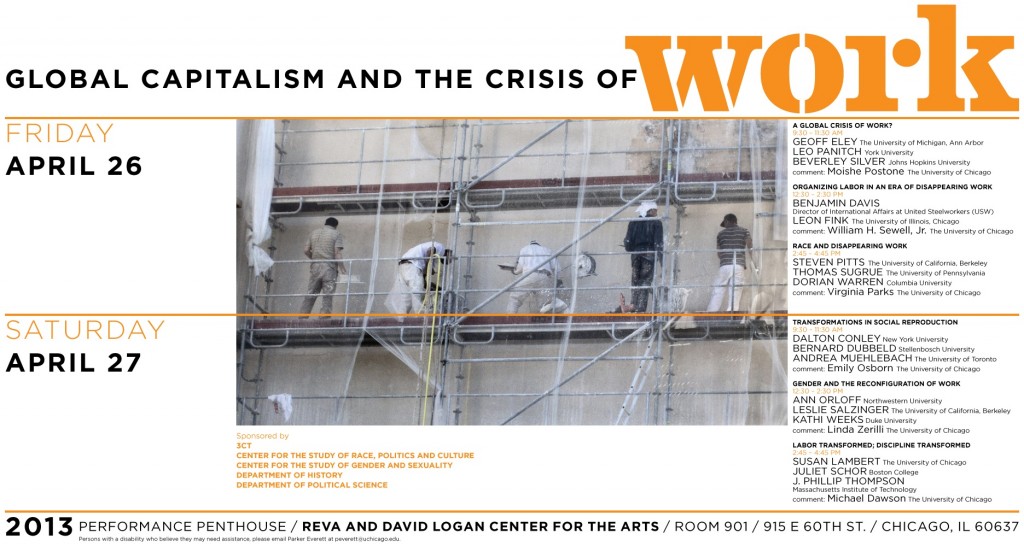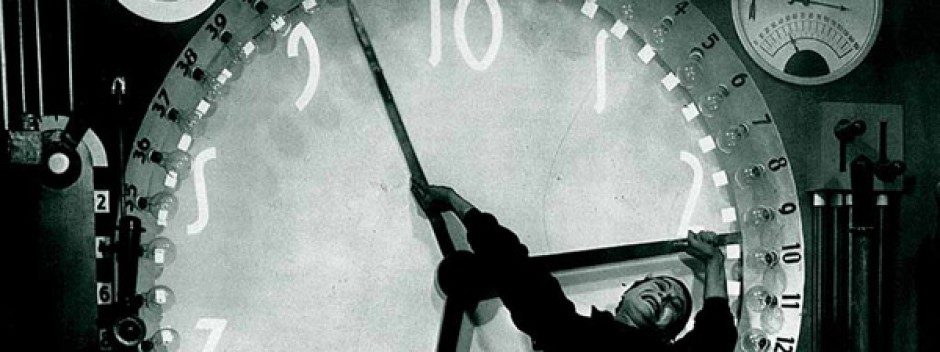Global Capitalism And The Crisis Of Work
April 26 2013, 9:30 am–April 27 2013, 5:00 pm
Logan Center Performance Penthouse
http://ccct.uchicago.edu/events/global-capitalism-and-the-crisis-of-work/
The History, Social Theory, and Capitalism Project of the Chicago Center for Contemporary Theory; the Center for the Study of Race, Politics and Culture; The Center for the Study of Gender and Sexuality have convened a two-day conference on ” Global Capitalism and the Crisis of Work,” to be held at the University of Chicago on April 26 and 27, 2013. The conference will be devoted to the structural transformations of capitalism and of the world of work in recent decades. It will also investigate the relationship between these changes and the fortunes of various social movements, including those based on identities. Finally, it will ask about the future of work, itself.
Work and its social, cultural, and political problems have become increasingly peripheral to academic studies on both the theory and the practice of democratic politics and of social movements in recent decades. Ironically, this diminished interest in work – its history, meaning, political potential, and likely place in the future world – has occurred during a fundamental transformation of work and its social meaning that cries out for critical analysis.
From the 1830s to the 1970s, movements that sought to create more egalitarian or democratic societies focused largely on the problem of work. In retrospect, one can argue that the dual crisis of Fordist/Keynesian capitalism in the West and “actually existing socialism” in the East began a long-term structural decline of the industrial working class and, hence, of the social basis of working-class movements and their power. Over the ensuing decades, automation and industrialized agriculture have displaced labor in factory and field. Meanwhile, globalization has sent industrial production and service employment on an international search for low-cost non-unionized workers, but the relentless advance of automation has also begun to limit the growth of proletarian labor even in the low wage countries. However, the rise of automation and the declining salience of industrial work have not led to the emancipation from toil. Furthermore, the performance of work continues to be a condition for social and political belonging. This remains true even at present as the labor time has increased for some and been eliminated through long-term unemployment for many others.
These developments in the problem of work associated with neo-liberal global capitalism also have implications for understanding the contemporaneous rise to prominence of social movements focused on gender, race, nation, ethnicity, and sexuality. Academics have lately increasingly turned their attention to the racialized and gendered conceptualizations of categories and experiences of work and, more generally, to the relation of different populations historically to the uneven global development of capitalism. Nevertheless, the salience of these racialized and gendered patterns for the capitalist restructuring of work calls for further investigation. We believe it is time to rethink the relation of identity-based movements to the recent development of capitalism and to the structural transformations of work. Finally, the combination of rapid advances in technology and the urgent demands for restraint in order to preserve the global ecology asks how work and its socio-political significance will be transformed in the future.
The goal of this conference is to take stock of these transformations and to ponder their implications. We look forward to learning about your reflections on problems of work – including speculative reflections on the broader issues raised by the conference. It is our sense that a major rethinking of the problematic of work, its history, and its future prospects is overdue.
This event is sponsored by 3CT; The Center for The Study Of Race, Politics, and Culture; and The Center for The Study of Gender and Sexuality.
Persons with a disability who believe they may need assistance, please email Parker Everett at peverett@uchicago.edu

